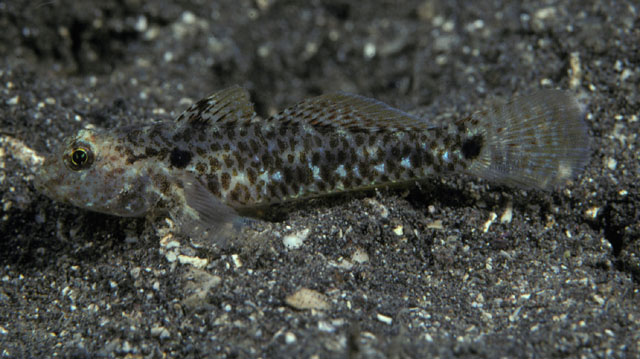| Gobiidae (Gobies), subfamily: Gobiinae |
| 4.4 cm SL (male/unsexed); 3.18 cm SL (female) |
|
demersal; marine; depth range 3 - 30 m |
| Indo-Pacific: Red Sea to French Polynesia, north to the Ryukyu Islands, south to the Great Barrier Reef and New Caledonia. |
|
Dorsal spines (total): 7-7; Dorsal soft rays (total): 9-9; Anal spines: 1-1; Anal soft rays: 8-8; Vertebrae: 26-26. Diagnosis: Dorsal rays VI - I,9. Anal rays 1,8. Pectoral rays 17-19 (usually 18). Longitudinal scale series 25. Head naked except for scales on side of nape reaching nearly to orbit. Posterior nostril near edge of orbit. Body depth 4.4-4.8 in SL; snout short, 3.4 - 3.7 in head. First dorsal fin not higher than second (longest dorsal soft ray longer than longest dorsal spine); second or third dorsal spines longest, 5.35-5.8 in SL. Pelvic fins fully joined medially by membrane (when intact); pelvic frenum present. Body translucent with numerous small dusky orange-yellow spots on head and body, those on head in oblique rows; a round black spot as large or larger than pupil in humeral region just above base of pectoral fin, and a second black spot of about the same size at mid base of caudal fin (Ref. 41649). |
| Inhabits sand-rubble bottoms next to reefs in 3-30 m (Ref. 90102). |
|
Least Concern (LC); Date assessed: 13 March 2015 Ref. (130435)
|
| harmless |
Source and more info: www.fishbase.org. For personal, classroom, and other internal use only. Not for publication.
